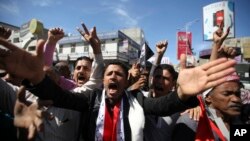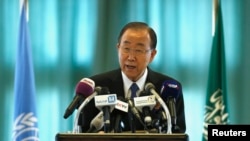U.N.-brokered talks aimed at resolving the political crisis in Yemen resumed Monday, but two parties promptly walked out.
Islah, an opposition party merging Islamist and tribal interests, and the smaller pan-Arab Nasserist Organization, quit the talks in a Sana'a hotel, saying they had been threatened by a Houthi representative, Mehdi al-Meshaat.
The negotiations are aimed at resolving the political crisis in the volatile Arabian Peninsula state. Shi'ite Houthis captured the capital last September and took over the government last week, dissolved parliament and forced the ouster of Western-backed President Abd Rabbuh Mansour Hadi.
"The situation is very very seriously deteriorating with the Houthis taking power and making this government vacuum in power. There must be a restoration of legitimacy of President Hadi," U.N. Secretary-General Ban Ki-moon said.
Nasserite party chief Abdullah al-Noman said his party would not return to the talks and said the Houthis "have threatened to take measures" against those opposing their "constitutional declaration" under which they took over the government.
The fractious parties had negotiated last week, but the talks fell apart Thursday. As he reconvened the talks, U.N. envoy Jamal Benomar said the country is at a "crossroads" and urged the parties to reach a political consensus.
Houthi leaders have described the takeover as a way to avert the threat of al-Qaida's strong presence in east and south Yemen. But Saturday, as thousands of protesting Yemenis took to the streets in several key cities, Yemen's neighbors denounced the takeover as a coup d'etat.
The six-nation Gulf Cooperation Council, led by Sunni-ruled Saudi Arabia and the United Arab Emirates, also described the takeover as an unacceptable "escalation" that threatens Yemen's security and stability.
The United States on Friday also rejected the Houthi move, saying it is "not a consensus-based solution" to the crisis.
Yemen, which occupies the southern tip of the Arabian Peninsula, has experienced political turmoil since 2011, when protesters inspired by the Arab Spring movement forced the overthrow of then-president Ali Abdullah Saleh. Analysts say the ousted leader is now thought to be backing the Houthis.
The country is also battling an ongoing al-Qaida insurgency with the help of U.S. drones. Despite the political upheaval, U.S. President Barack Obama vowed late last month that there would be no let-up, saying the United States would continue to pursue "high value targets inside Yemen." At least three drone attacks have been launched since then.







